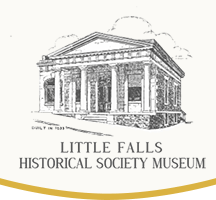Gettysburg Address Monument
Written and narrated by Matt Zink, Cooperstown Museum Studies Graduate Program, SUNY Oneonta, Researched in 2023.
In February of 1861, hundreds of residents gathered at the train station here in Little Falls to catch a glimpse of a lanky, bearded Midwesterner.
Little Falls was among the many stops of recently elected Abraham Lincoln’s train as he made his way to Washington D.C. to assume the presidency. Lincoln was only able to say a few brief remarks to the gathered crowd before the train had to continue, but his powerful words elsewhere made a lasting impact here.
This monument was dedicated in Little Falls on Decoration Day (now Memorial Day) in the summer of 1917. Although the Civil War had ended 52 years prior, Lincoln’s powerful words on democracy and freedom no doubt remained relevant in the minds of all Americans, who had just entered into World War I.
In his address at Gettysburg, Lincoln transformed the purpose of the Civil War.
What began as a fight to end Southern secession became a crusade against the evils of slavery in our nation. Looking back to our Declaration of Independence, Lincoln redefines American liberty, challenging the preconceived notions that enabled slavery to exist in the United States. Union soldiers were no longer fighting and dying only to reunify the county – they made their sacrifice to set the United States on a path to true freedom and equality.
The placement of this monument here in Ward Square is relevant even in modern times. From where you stand now, you can walk to the center of Ward Square and visit the Brave Defenders Civil War soldier monument, or head down the sidewalk and see Little Falls’ War Memorial. In the sacrifices honored by these other monuments, Lincoln’s vision for freedom and equality extends beyond its historical context.
Just as Little Falls had welcomed Lincoln during his travels in 1861, its residents also bade him farewell. When the remains of recently assassinated President Lincoln passed through Little Falls in 1865, a large crowd of mournful residents gathered to pay their respects as his funeral train rolled by, returning the martyred President to his Springfield, Illinois home.



